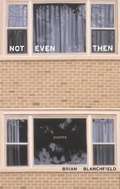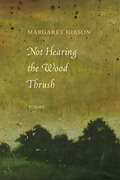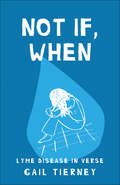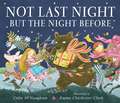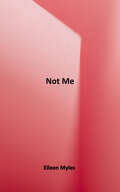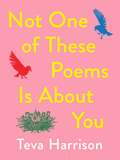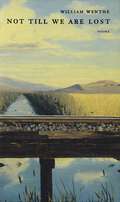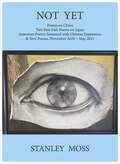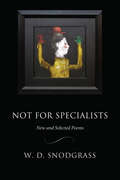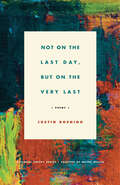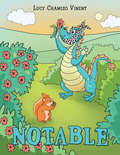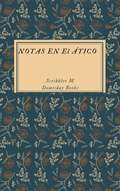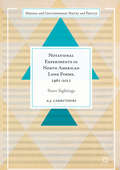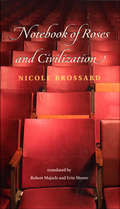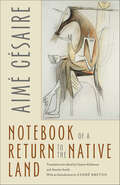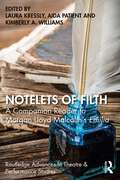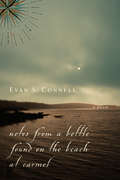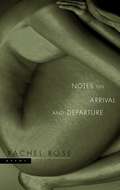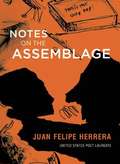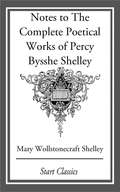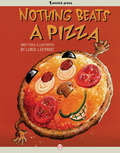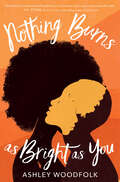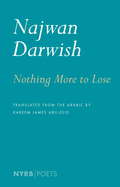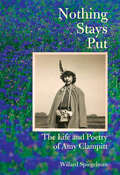- Table View
- List View
Not Even Then: Poems
by Brian BlanchfieldNot Even Then introduces poetry, compressed and musically fluid, beseechingly intimate and oddly authoritative. Blanchfield conducts readers through a unique, theatrical realm where concepts and personages are enlivened into action: Continuity, Coincidence, Symmetry, and Shame keep uneasy company there with Marcel Duchamp and Johnny Weissmuller, Lord Alfred Douglas and "Blue Boy" Master Lambton, Juliet's Nurse and Althusser's Moses.
Not Hearing the Wood Thrush: Poems
by Margaret Gibson“I look about and find whatever I see / unfinished,” Margaret Gibson writes in these powerful and moving poems, which investigate a late-life genesis. Not Hearing the Wood Thrush grapples with the existential questions that come after experiencing a great personal loss. A number of poems meditate on loneliness and fear; others speak to “No one”—a name richer than prayer or vow.” In this transformative new collection, Gibson moves inward, taking surprising, mercurial turns of the imagination, guided by an original and probative intelligence. With a clear eye and an open heart, Gibson writes, “How stark it is to be alive”—and also how glorious, how curious, how intimate.
Not If, When: Lyme Disease in Verse
by Gail TierneyEven the most integrative, supportive doctor can only do so much for an individual during the worst period of healing from Lyme. The process looks different for everyone, but a patient must feel significantly worse before they begin to recover. When Lyme bacteria (or other coinfections) are first attacked by antibiotics, herbs, or other treatment, they release toxins into the body quicker than they can be dispelled. This is called a Jarisch-Herxheimer (Herx) reaction, and it can often include panic attacks, brain fog, paranoia, depression, pain, affected vision, racing heartrate, dysfunctional thyroid, disrupted digestion, severe confusion, and amnesia among many other symptoms. Herxing, in other words, is a complete—and sometimes seemingly unending—nightmare. When you’ve fretted about that frustrating doctor all night and Herxed all day, these autobiographical poems may go down smoother than a pill. Arranged chronologically in the order that they were written, they move from devastation to determination, addressing the various frustrations and dynamics of living with chronic Lyme disease—the isolation, the trauma, the fear—and also providing a voice of solidarity and inspiration for those suffering from this devastating illness. Written as a love letter for Lyme patients who are running out of patience, as well as for their family and friends, Not If, When is a clear-eyed, defiant, and poignant exploration of what it means to live—and sometimes even thrive—with Lyme.
Not Last Night But The Night Before
by Colin McnaughtonNot last night but the night before, Three black cats came knocking at the door. The Man in the Moon arrives next, followed by the Three Little Pigs, Little Bo-peep, Miss Muffet, and others. But where are they all rushing with presents in hand? In this fanciful story told in energetic rhyme by Colin McNaughton and whimsically illustrated by Emma Chichester Clark, one boy's quiet night turns into a celebration full of beloved childhood characters.
Not Me
by Eileen MylesThis brilliant, incisive volume captures the high points of Myles's work in New York City during the 1980s. Listen, I have been educated. I have learned about Western Civilization. Do you know what the message of Western Civilization is? I am alone. This breakthrough volume, published in 1991 by the author of Cool For You and Chelsea Girls, captures the high points of Myles's work in New York City during the 1980s. Poet, novelist, lesbian culture hero and one-time presidential candidate, Myles has influenced a whole generation of young queer girl writers and activists. She is one of the most brilliant, incisive, immediate writers living today.
Not One of These Poems Is About You
by Teva HarrisonFrom Teva Harrison, the award-winning author and illustrator of In-Between Days, comes a powerful work of poetry and art in which she continues to explore what it means to live with metastatic breast cancer.In this remarkable, frank, and gut-wrenching mix of words and images, Teva continues on her journey, grappling with what it means to live with metastatic breast cancer. She plunges deep into her inner world, shadowing the progression of the disease. Reality takes on sharp edges: the swell of cancer and its retreat with chemo. Her inner corporeal reality versus her outer manifestation of health, vitality, and femininity. Holding fast to the great love of her life, while preparing to leave him behind. Contemplating who she was before cancer, and who she is now.Starkly honest and wholly profound, Not One of These Poems Is About You distills life to its essence. Teva Harrison continues to gift the world with her clear-eyed insight and her open heart.
Not Till We Are Lost: Poems
by William WentheWilliam Wenthe's second collection of poetry is a personal amplification of a passage from Henry Thoreau's Walden, "Not till we are lost, in other words, not till we have lost the world, do we begin to find ourselves, and realize where we are and the infinite extent of our relations." Beginning with the necessary dislocation and loss that accompany adulthood, these strong and moving poems tell a story of a man's losing his way in the midst of personal tragedies -- the death of his parents and the end of a marriage -- only to discover the true depth of his connection with others and ultimately with the divine. In a variety of free verse, traditional forms, and sonnets, the poet begins to reassess his life and his art and considers the possibility that language may distance us from the real as much as bind us to it.Both deeply personal and powerfully spiritual, Not Till We Are Lost strives toward the rediscovery of relations -- to family and lover, to culture, to environment. Whether in a desert canyon or a high-rise hotel or wading waist-deep in a river, the poet, solid and honest, is always aware of his ties to history and its artistic representations. The destination, as well as the difficult means of arrival, is love, no mere word but a pain and sweetness in which loss and celebration converge.
Not Yet: Poems on China Two Raw Fish Poems from Japan American Poems Seasoned with Chines e Experience & New Poems, November - June 2021
by Stanley MossNot Yet by Stanley Moss is best described metaphorically: it is a freight train loaded with poetry that includes Poems on China (Stanley Moss taught English in China thirty years ago), a compartment of Two Raw Fish Poems from Japan, then there's an extra long boxcar, a lifetime of American Poems Seasoned with Chinese Experience. Finally, there's the club car, Not Yet, a section of new poems written June 20th 2020 - May 1st 2021. Not Yet includes a preface by Stanley Moss, an afterword by Fu Hao, visiting scholar of Chinese at Cambridge University. Much of the book will be translated by him into Chinese for the many millions of Chinese who read English poems.
Not for Specialists: New and Selected Poems (American Poets Continuum)
by W.D. SnodgrassUntil the late 1970s, W. D. Snodgrass was known primarily as a confessional poet and a key player in the emergence of that mode of poetry in the late 1950s and early 1960s. Snodgrass makes poetry out of the daily neuroses and everyday failures of a man—a husband, father, and teacher. This domestic suffering occurs against a backdrop of more universal suffering which Snodgrass believes is inherent in the human experience. Not for Specialists includes 35 new poems complemented by the superb work he wrote in the Pulitzer Prize winning collection, Heart’s Needle, along with poetry from seven other distinguished collections.from "Nocturnes"Seen from higher up, it makes its first move in the low creekbed, the marshlands down the valley, spreading across the open hayfields, the hedgerows with their tops still lit, laps the roadbed, flows over lawns and gardens, past the house and up the wooded hillside back behind us till only some few rays still scythe between the treetrunks from the far horizon and are gone.W. D. Snodgrass, born in Pennsylvania in 1926, is the author of more than 20 books of poetry, including The Fuehrer Bunker: The Complete Cycle (BOA, 1995); Each in His Season (BOA, 1993); and Heart's Needle (1959), which won the Pulitzer Prize for Poetry. His other books include To Sound Like Yourself: Essays on Poetry (BOA, 2002), After-Images: Autobiographical Sketches (BOA, 1999) and six volumes of translation, including Selected Translations (BOA Editions, 1998), which won the Harold Morton Landon Translation Award.
Not on the Last Day, But on the Very Last: Poems
by Justin BoeningWinner of the National Poetry Series: “Filled with unusual juxtapositions and quick cuts that make the poems seem movielike, even trancelike.” —Library JournalMothers masquerading as witches and sepulchral bellhops who reveal themselves to be fathers: In Justin Boening’s debut collection of poems, selected for the National Poetry Series by Wayne Miller, nothing is as it seems.Peopled by figures both uncanny and tragic—lionesses who dance and cry, surgeons who carry with them the trauma of past lives, an opera singer whose notes go awry—Not on the Last Day, but on the Very Last uses the language of dreams and of fairy tales to deliver a keenly felt exploration of family, grief, regret, and belonging. Here everything stands for something else. But though the Freudian mother and father lurk behind every sequined costume, continue to strip away the masks, Boening suggests, and you’ll find an even more primal absence at the center—Nobody, No One, mortality, death. Beyond that, we find, lies only the truth of our relationships with each other.Shot through with mournfulness, gorgeously spangled in its language—“a squall of chrysanthemums / and the weird”—Not on the Last Day, but on the Very Last is an unforgettable collection about our human failings and the grace we each seek.“A stunning achievement.” —John Ashbery
Notable
by Lucy Chamizo VinentHazle sitio a Notable entre tus libros. Un amigo imprescindible a la hora del esparcimiento de todos en la casa. Este poemario no impone la barrera de la edad. En Notable hay juegos para todos. Lo fantasioso supera la realidad expresado en poemas rimados, el uso delicado del humor, la fabulación, el lenguaje sencillo pero cuidando, el aspecto lúdico. De ahí que su lecturasatisfaga el disfrute de los pequeños y hasta de los que ya rebasaron la infancia.
Notas en el ático
by Scribbler MUna colección de poemas para todos, en verso libre, por Scribbler. Los poemas son de lectura ligera y relajada.
Notational Experiments in North American Long Poems, 1961-2011
by A. J. CarruthersThis book is a critical experiment that tracks the literary and poetic uses of musical notation and notational methods in North American long poems from the middle of last century to the contemporary moment. Poets have readily referred to their poems as "scores. " Yet, in this study, Carruthers argues that the integration of musical scores in expansive works of this period does more work than previously thought, offering both resolution and escape from the demands placed on long poem form. The five case studies, on Langston Hughes, Armand Schwerner, BpNichol, Joan Retallack and Anne Waldman, offer approaches to reading literary scores in what might be described as a critical stave or a critical "fugue" of instances. In differing ways, musical notation and notational methods impact the form, time and sometimes the ethical and political stances of these respective long poems.
Notebook of Roses and Civilization
by Nicole Brossard Robert MajzelsThe heat of summer on an earlobe, a parking meter, the shadow of crabs and pigeons under a cherry tree, an olive, a shoulder blade in the poems of Nicole Brossard these concrete, quotidian things move languorously through the senses to find a place beyond language. Taken together, they create an audacious new architecture of meaning.Nicole Brossard, one of the world's foremost literary innovators, is known for her experiments with language and her groundbreaking treatment of desire and gender. This dextrous translation by the award-winning poets and translators Erin Moure and Robert Majzels brings into English, with great verve and sensitivity, Brossard's remarkable syntax and sensuality. '[Brossard's] use of elliptical formulations and syntactical hijackings creates tensions between the image and the statement that result in a style that is unmistakably hers.' - La Presse'A new work by Brossard is an event ... Yesterday, at the Hotel Clarendon is not merely experimental. It's radical.' - The Globe and Mail
Notebook of a Return to the Native Land (Wesleyan Poetry Series)
by Aimé CésaireAimé Césaire's masterpiece, Notebook of a Return to the Native Land, is a work of immense cultural significance and beauty. The long poem was the beginning of Césaire's quest for négritude, and it became an anthem of Blacks around the world. With its emphasis on unusual juxtapositions of object and metaphor, manipulation of language into puns and neologisms, and rhythm, Césaire considered his style a "beneficial madness" that could "break into the forbidden" and reach the powerful and overlooked aspects of black culture.Clayton Eshleman and Annette Smith achieve a laudable adaptation of Césaire's work to English by clarifying double meanings, stretching syntax, and finding equivalent English puns, all while remaining remarkably true to the French text. Their treatment of the poetry is marked with imagination, vigor, and accuracy that will clarify difficulties for those already familiar with French, and make the work accessible to those who are not. André Breton's introduction, A Great Black Poet, situates the text and provides a moving tribute to Césaire.Notebook of a Return to the Native Land is recommended for readers in comparative literature, post-colonial literature, African American studies, poetry, modernism, and French.
Notelets of Filth: A Companion Reader to Morgan Lloyd Malcolm's Emilia (Routledge Advances in Theatre & Performance Studies)
by Morgan Lloyd Malcolm Aida Patient Kimberly A. Williams Laura KresslyThis collection of short, accessible essays serves as a supplementary text to Morgan Lloyd Malcolm’s play, Emilia. Critically acclaimed and beloved by audiences, this innovative and ground-breaking show is a speculative history, an imaginative (re)telling of the life of English Renaissance poet Aemilia Bassano Lanyer. This book features essays by theatre practitioners, activists, and scholars and informed by intersectional feminist, critical race, queer, and postcolonial analyses will enable students and their teachers across secondary school and higher education to consider the play’s major themes from a wide variety of theoretical and interdisciplinary perspectives. This volume explores the current events and cultural contexts that informed the writing and performing of Emilia between 2017 and 2019, various aspects of the professional London productions, critical and audience responses, and best practices for teaching the play to university and secondary school students. It includes a foreword by Emilia playwright Morgan Lloyd Malcolm This book will be of great interest to students and scholars of theatre, arts activism, feminist literature, and theory.
Notes from a Bottle Found on the Beach at Carmel: A Poem
by Evan S. ConnellPraise for Notes from a Bottle Found on the Beach at Carmel"A unique tour de force" -The New York Times Book Review"One of the most remarkable books that I have read in a long time." -Kenneth Rexroth"Mr. Connell's NOTES are what one intelligent, sensitive artist has been able to salvage from all experience as testimony to the rather pathetic integrity of the human species in the face of extinction. The book is no manual or tract, however, although its political meaning is unmistakable, but a work of art, even a work of high art." -Hayden Carruth
Notes of an Alchemist
by Loren C. EiseleyPoems on crystals, birds, the outdoors and all aspects of nature.
Notes on Arrival and Departure: Poems
by Rachel RoseRachel Rose follows her award-winning first book with a dazzling, urgent collection of new poems that look unflinchingly at our errors and our longings, in images that range from the disturbing to the spectacular. Anchoring the collection is a rich, unsentimental suite of lyrics on the journey of pregnancy and new motherhood. These poems are humanist, lushly imagined, and compellingly voiced.From the Trade Paperback edition.
Notes on the Assemblage
by Juan Felipe Herrera<p>Juan Felipe Herrera, the first Latino Poet Laureate of the United States and son of Mexican immigrants, grew up in the migrant fields of California. <p>Exuberant and socially engaged, reflective and healing, this collection of new work from the nation's first Latino Poet Laureate is brimming with the wide-open vision and hard-won wisdom of a poet whose life and creative arc have spanned chasms of culture in an endless crossing, dreaming and back again.</p>
Notes to The Complete Poetical Works of Percy Bysshe Shelley
by Mary Wollstonecraft ShelleyMary Shelley (née Mary Wollstonecraft Godwin, often known as Mary Wollstonecraft Shelley) was a British novelist, short story writer, dramatist, essayist, biographer, travel writer, and editor of the works of her husband, Romantic poet and philosopher Percy Bysshe Shelley. She was the daughter of the political philosopher William Godwin and the writer, philosopher, and feminist Mary Wollstonecraft. Mary Shelley was taken seriously as a writer in her own lifetime, though reviewers often missed the political edge to her novels. After her death, however, she was chiefly remembered only as the wife of Percy Bysshe Shelley and as the author of Frankenstein. It was not until 1989, when Emily Sunstein published her prizewinning biography Mary Shelley: Romance and Reality, that a full-length scholarly biography analyzing all of Shelley's letters, journals, and works within their historical context was published. The well-meaning attempts of Mary Shelley's son and daughter-in-law to "Victorianise" her memory through the censoring of letters and biographical material contributed to a perception of Mary Shelley as a more conventional, less reformist figure than her works suggest. Her own timid omissions from Percy Shelley's works and her quiet avoidance of public controversy in the later years of her life added to this impression. The eclipse of Mary Shelley's reputation as a novelist and biographer meant that, until the last thirty years, most of her works remained out of print, obstructing a larger view of her achievement. She was seen as a one-novel author, if that. In recent decades, however, the republication of almost all her writings has stimulated a new recognition of its value. Her voracious reading habits and intensive study, revealed in her journals and letters and reflected in her works, is now better appreciated. Shelley's recognition of herself as an author has also been recognized; after Percy's death, she wrote about her authorial ambitions: "I think that I can maintain myself, and there is something inspiriting in the idea". Scholars now consider Mary Shelley to be a major Romantic figure, significant for her literary achievement and her political voice as a woman and a liberal.
Nothing Beats a Pizza
by Loris LesynskiThe opening refrain of Nothing Beats a Pizza is catchy and fun, just like all 32 poems found in Loris Lesynski's book. Dancing across the pages are illustrations and poems alive with humor, exploring important things in a kid's world: pizza, substitute teachers, homework, moods, food, and pets.
Nothing Burns as Bright as You
by Ashley WoodfolkFrom acclaimed author Ashley Woodfolk, Nothing Burns as Bright as You is an impassioned story about queer love, grief, and the complexity of female friendship that will keep your heart racing, and breaking, until the very last page. <p><p> Two girls. One wild and reckless day. Years of tumultuous history unspooling like a thin, fraying string in the hours after they set a fire. <p><p> They were best friends. Until they became more. Their affections grew. Until the blurry lines became dangerous. <p><p> Over the course of a single day, the depth of their past, the confusion of their present, and the unpredictability of their future is revealed. And the girls will learn that hearts, like flames, aren’t so easily tamed. <p><p> It starts with a fire. How will it end?
Nothing More to Lose
by Najwan Darwish Kareem James Abu-ZeidNothing More to Lose is the first collection of poems by Palestinian poet Najwan Darwish to appear in English. Hailed across the Arab world and beyond, Darwish's poetry walks the razor's edge between despair and resistance, between dark humor and harsh political realities. With incisive imagery and passionate lyricism, Darwish confronts themes of equality and justice while offering a radical, more inclusive, rewriting of what it means to be both Arab and Palestinian living in Jerusalem, his birthplace.igious traditions--has made Darwish one of the very few Palestinian poets to garner a large readership outside his homeland. While so many poets within Palestine are trying to follow in the footsteps of Mahmoud Darwish--whose influence on Palestinian poetry was enormous from the 1960s to his death in 2008--Najwan Darwish is widely respected for his refusal to take on the mantle of his famous namesake (to whom he bears no relation). This refusal is clearest in his own poetic rebuttal to Mahmoud Darwish's best-known poem, "Identity Card"--a radical rewriting that espouses a more inclusive view of what it means to be both Arab and Palestinian.
Nothing Stays Put: The Life and Poetry of Amy Clampitt
by Willard SpiegelmanAn evocative portrait of the beloved and acclaimed poet, whose late-in-life success took the literary world by storm.&“From the bright strands of Amy Clampitt&’s extraordinary life and poems—plus letters, diaries, and extensive interviews—Willard Spiegelman has woven a gorgeous tapestry of a book.&” —Patrick Phillips, author of Song of the Closing DoorsWith the publication of her first book of poems in her sixty-third year, Amy Clampitt rose meteorically to fame, launching herself from obscurity to the upper ranks of American poetry all but overnight, and living a whirlwind eleven years, until her death in 1994. Years later, as renowned poetry scholar Willard Spiegelman wades into her papers and poems, he discovers a woman of dazzling intellect, staunch progressive politics, and an inexhaustible sense of wonder for the world and the words we&’ve invented to describe it.Giving equal weight to the life and the poetry, Spiegelman untangles Clampitt&’s famously allusive lines to reveal the experiences they emerged from, pulling the curtain back on her nearly four decades of artistic anonymity, and in doing so assembling a rich period piece of Manhattan during the days in which Clampitt worked for Oxford University Press and the National Audubon Society—writing cheery, discursive office memos, and two novels that never got published, before hitting her stride in verse.Nothing Stays Put is a gift to poetry fans, an inspiration to artists striving at any age, and an ode to this most unlikely of literary celebrities, who would publish five acclaimed books and win a MacArthur &“Genius Grant&” nearly all in the final decade of her life.
